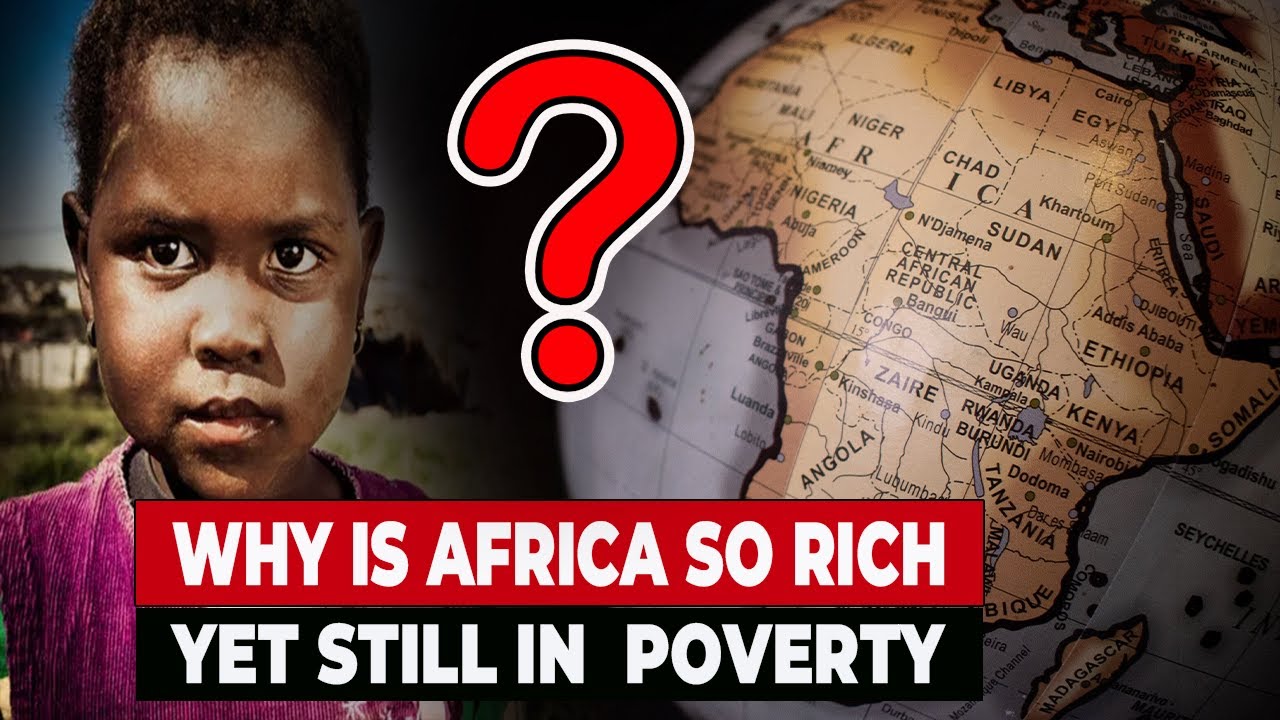Why is Africa still poor?
What comes to mind when you hear the word Africa? We imagine it
will be words like poverty, famine, wars, and diseases like Ebola, monkey pox,
and malaria, or even malnourished children with flies buzzing around their faces for
those who know little about the continent. More than 60 years after the majority of African
countries achieved political independence, Africa is still struggling to keep its head above water.
Africa's image deteriorated to the point where an economist labeled it the "hopeless continent" in
2000. With a bad reputation in almost every aspect of life, many questions arise, such as why Africa
as a continent is rich but her people are poor, resulting in a paradox of plenty.
Stay with us
until the end of this video to figure it out for yourself. Also, let us know what you think
by leaving a comment in the section below. According to the World Bank, the International
Poverty Line refers to those who earn less than $1.25 USD per day and thus live on the brink
of extinction. The United Nations Development Program (UNDP) uses the Human Development Index
(HDI) to measure poverty in Africa and the rest of the world.
"To understand why Africa is
still lagging behind, colonization must be judged harshly, akin to slavery, because there
is no justification for the domination of one people by another," said Rev. Lathe Sess Honoré,
professor at the Methodist University of Côte d'Ivoire's Faculty of Economics and Management and
former consultant at the African Development Bank. Corruption
African political elites bear responsibility for the continent's poverty,
in addition to the egregious and long-lasting impact of past colonizers. As evil scourges,
embezzlement and misappropriation of funds and resources, the scandalously lavish lifestyle
of African elites, nepotism and tribalism, the desire to hold onto positions of power
and rule for life, and the selling off of countries' natural resources are major reasons
the continent is so far behind in development. Growth of population
Despite numerous prevention and education campaigns, African population growth is
rapid. Developmental success and economic growth cannot keep up. As a result, an increasing number
of Africans are living in poverty.
According to a recent UNICEF study, Africa's population
will double to two billion people by 2050. War and crises
In 2013, 11 of the world's 20 war-related conflicts were fought on the African
continent alone, all in Sub-Saharan Africa. This includes wars in Sudan and South Sudan, Somalia,
Nigeria, Mali, the Democratic Republic of the Congo and the Central African Republic, and,
most recently, Cameroon. Agricultural production usually comes to a halt in crisis areas. Many
people flee, are evicted from their homes, and are reliant on outside assistance.

As a result
of these wars, poverty in Africa is increasing. Illnesses
There are numerous diseases throughout the world, but the most dangerous
are concentrated in Africa. Diseases like AIDS, malaria, and Ebola are both the cause and the
result of poverty in Africa. Diseases spread faster and cannot be treated in many areas due to
a lack of education and inadequate medical care. The population's average life expectancy
is decreasing, while the number of orphans is increasing. Labor shortages are
especially noticeable in agriculture, resulting in lower food production.
Unjust trade structures Rich countries create unfair trading structures
by shielding their markets with high agricultural tariffs and heavily subsidized agriculture.
This slows agricultural development on the African continent, causing it to suffer from the
start. With their policies, the governments of the United States, Europe, and other prosperous
countries contribute to poverty in Africa. Inadequate agricultural infrastructure
Several African countries had the same GDP as Asian countries in the 1970s.
Africa, to
some extent, fell behind in the Green Revolution. Asian countries, on the other hand, were able
to ensure food security through agricultural development investment. Roads, wells, irrigation
systems, storage facilities, agricultural machinery – agriculture lacks both infrastructure
and expertise in many African regions. That is why local self-help is critical in combating poverty
in Africa. Once agriculture is secure, labor and capital surpluses are used to fund industrial
and service investments, which serve as the economy's backbone. Meanwhile, African countries,
particularly those in the Sub-Saharan region, face critical challenges due to their proximity to the
equator, which results in different land, climate, and weather conditions, as well as drought, flood,
and a lack of farming experience (due to the habituation of gathering and hunting). Cultivation
becomes more difficult in the farming mindset. Influence of external factors.
Privatization of national companies with capital poured in from Western countries
was later labeled neocolonialism, resulting in the bankruptcy of local businesses, rampant
unemployment, and a lack of output. Furthermore, these programs took a top-down approach rather
than a bottom-up approach, which seeks solutions based on people's actual needs.
As a result,
these programs quickly failed, and the demand for democracy, which goes against multi-tribal
grain/nature/traditions, has caused many African countries to become more divided than ever.
Mismanagement of land Despite the fact that there is a lot of
arable land south of the Sahara Desert, small, individual land holdings are rare.
The land is subject to tribal ownership in many nations. Many countries lack a system of
freehold land ownership. Others prohibit people from disadvantaged groups from owning land
at all. Although these laws are frequently disregarded and land sales to disadvantaged groups
occur, legal title to the land is not guaranteed. As a result, rural Africans rarely have clear
title to their own land and must rely on farm labor to survive. Unused land is abundant,
but it is frequently private property.
The relationship between climate change
and poverty has been investigated. Natural hazards are likely to grow in size, frequency,
and unpredictability as a result of climate change. However, the transformation of natural
hazards into disasters is anything but natural. The severity of a disaster's impact is
determined by the level of vulnerability present, the extent of exposure to the disaster
event, and the nature of the hazard.
The risk of disaster in a community is dynamic
and will change over time. It is heavily influenced by the interaction of economic,
sociocultural, and demographic factors, as well as distorted development, such
as rapid and unplanned urbanization. Africa is considered "rich" or "extremely
rich" in natural resources because it accounts for more than 30% of the world's mineral
resources, including gold, diamonds, oil, and gemstones. Tanzania, for example, is known
for gold, Congo for copper, Namibia for Uranium, and Botswana for diamonds. These are just a few
of the reasons why Africa remains impoverished. Tell us about any other reasons that we haven't
mentioned in this video. Thank you for watching, and please like, share, and subscribe to
Africa Reloaded for more educational videos..

